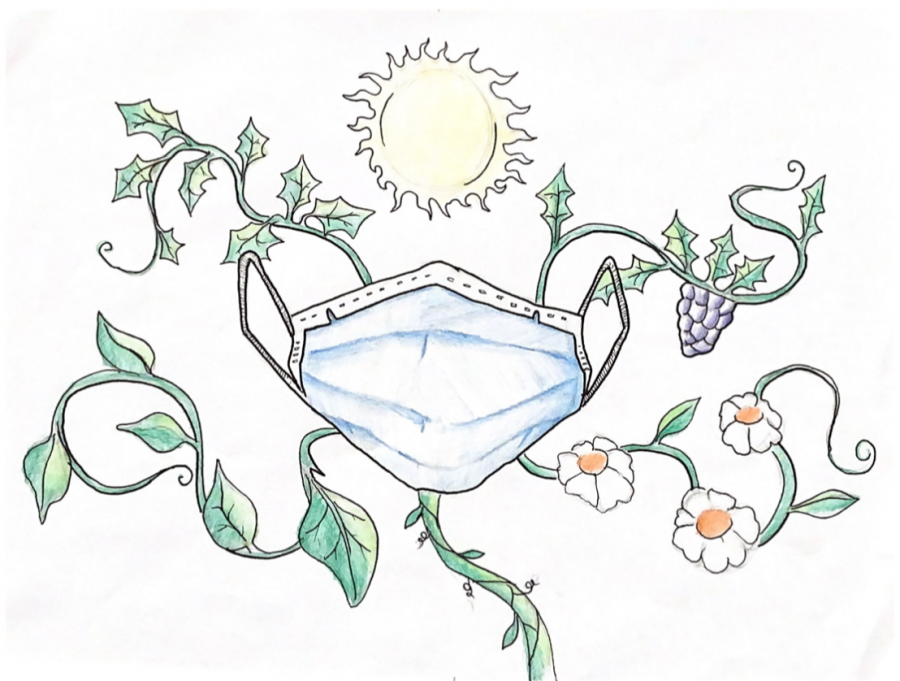To boost immunity, some turn to holistic methods for protection
Some members of the U-High community use natural remedies to boost their immunity to diseases.
December 14, 2021
Whenever he gets sick, Will Trone’s mom prepares him a mixture of echinacea tea and milk to mellow the flavor of the flower.
“She gives me a cup of tea. And then I drink it. And then she goes and makes me another one — keeps on going over and over again,” Will, a senior, said.
Will said he’s not sure if the tea makes him feel any better, but he appreciates his mom’s care and effort.
Echinacea contains a variety of active compounds that make it a popular herbal remedy. The flower is linked to reducing inflammation, improving immunity and lowering blood sugar levels.
Will’s mom’s echinacea concoction is one of many natural remedies people use to strengthen their health. As people re-enter the world outside their homes after months of curtailed activities, it’s important to be protective against diseases — even if it’s just the common cold and flu.
Ayurveda and Chinese traditional medicine have historically used foods, herbs and spices to help alleviate symptoms and improve health. Scientists are now looking into why many of these remedies actually have an effect.
While spending 40 years exploring how different kinds of food affected her body, Ann Marie Chereso, a U-High parent, discovered food can be used as a source of fuel and healing for her body. When she was a teenager she participated in Weight Watchers, a weight-loss program, and noticed how changing what she ate affected how she felt.
“I did it to lose weight…But what I started to realize was when I changed the way I was eating, I started to actually physically feel better,” Ms. Chereso said.
Science teacher Sharon Housinger said that while some traditions have proved to have no scientific evidence for their medicinal properties, scientists have discovered many true benefits. One example is food seasoning.
“It used to be this kind of myth that the reason we put seasoning on our food is because it kills all the bacteria and we can eat spoiled food,” Ms. Housinger said. “Turns out, you can’t eat spoiled food, even if you put spices on it.”
Even though some beliefs have proved to be wrong, Ms. Housinger said some spices and herbs do have medicinal properties.
A 12-week study found that participants who took daily garlic supplements had 63% fewer colds than subjects who didn’t take them. The lengths of cold symptoms of participants using garlic supplements also decreased by 70%.
Ms. Chereso also uses garlic for its medicinal properties but believes people should be conscious about how different foods may interact with their unique bodies.
“I think garlic is also a really good herb that I tend to rely on a lot, but I also have come to see that it depends on your ecosystem. We each have a unique ecosystem,” Ms. Chereso said.
Another herb known for its health benefits is turmeric.
“Turmeric is one herb that I think is a really good source for keeping your immune system happy and healthy,” Ms. Chereso said.
The pigmented spice has a long history of use in India, dating back 4,000 years to the Vedic culture and has since been discovered to have many medicinal purposes.
“Turmeric is traditionally used in India, like on the skin, if you have a rash or something because it’s anti-inflammatory,” Ms. Housinger said. “In fact, I take turmeric every day, because there’s a lot of evidence that it helps with joint inflammation and cardiovascular health and things like that.”
Both Ms. Housinger and Ms. Chereso said that the most important thing is to know your own body. Paying attention to what makes your body feel better and learning what to avoid is the best way to use food to improve your health.
Many foods are often attributed with having vast healing properties, but Ms. Housinger said there are limitations with what each herb can accomplish. Furthermore, she advises against trying to self-treat medical conditions. For example, some plants can have antidepressant effects, and some are poisonous.
“Having unregulated antidepressants can also cause other problems,” Ms. Housinger said, “so people shouldn’t try to treat themselves.”




























































